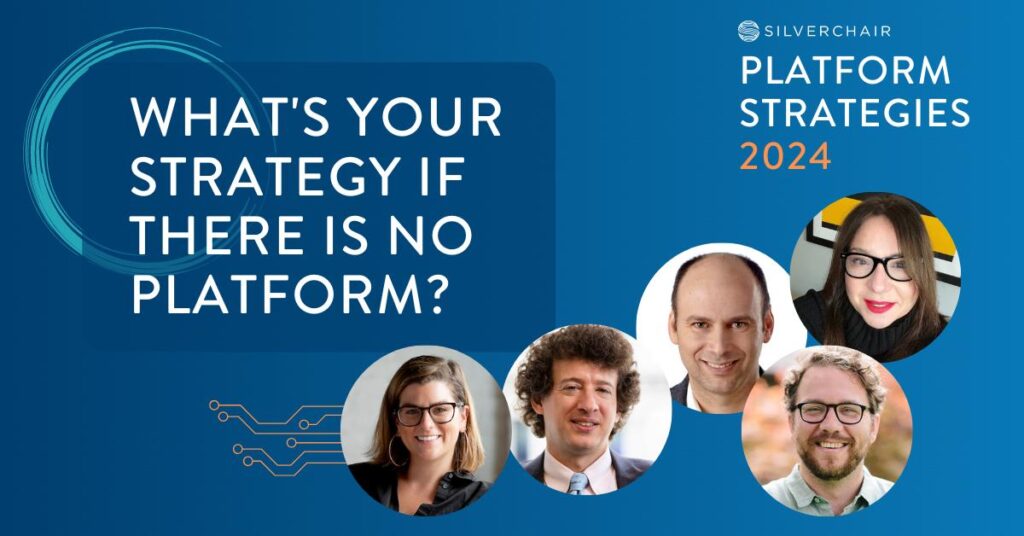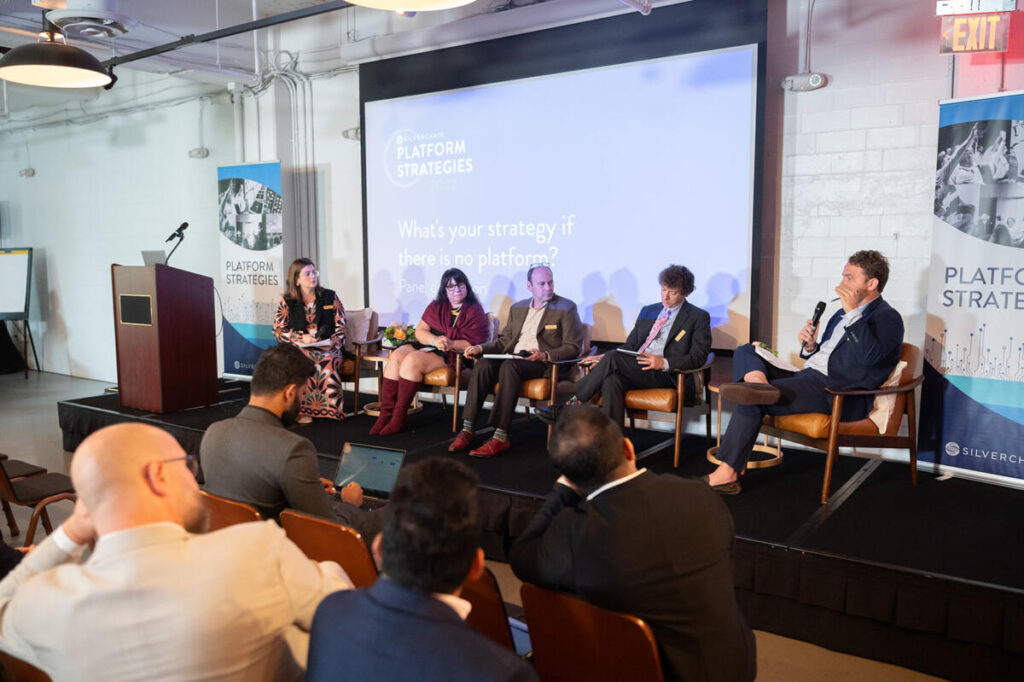'What's your strategy if there is no platform?' This provocative question anchored a panel discussion that challenges traditional publishing infrastructure assumptions.

What's Your Strategy If There Is No Platform?
The session, moderated by Hannah Heckner Swain, VP of Strategic Partnerships at Silverchair, brought together diverse perspectives to explore the evolving landscape of content discovery, user expectations, and business models in the age of AI and disintermediation.The panel, featuring Roy Kaufman (Managing Director Business Development and Government Relations, Copyright Clearance Center), Roger Schonfeld (VP, Libraries, Scholarly Communication and Museums, Ithaka S+R), Lori Carlin (Chief Commercial Officer and Senior Consultant, Delta Think) and Michael Hardesty (Manager, Digital Products and Platforms, National Academy of Sciences), delved into the challenges and opportunities facing publishers as traditional platform centric models are disrupted by new technologies and user behaviors.
AI and User Expectations: Leading Forces of Change
The session started with a poll: what do you think will have the most influence on the future of hosting platforms? Options included syndication, AI driven disintermediation, open access, funder mandates and shifting user expectations.Results revealed that attendees viewed AI-driven disintermediation and shifting user expectations as the most significant influences on the future of hosting platforms, with these options receiving 45% and 40% of the votes, respectively. This set the stage for a rich discussion on how publishers can adapt to these forces while maintaining their core value propositions.
Michael Hardesty of the National Academy of Sciences highlighted the shift in user behavior:
"When we're talking about discovery, the primary pathway for discovering and engaging with our content doesn't involve going to the organization, using the site search functionality, going to a landing page, going to the table of contents. There are some members of our audience that do engage that way, but it's a small percentage."
Trust, Authority, and the Version of Record
The importance of trust and authority emerged as a central theme throughout the panel discussion."To me, it's that a big part of what publishers do is apply a signal that indicates trust and authority in the content. I think the fact that that is fundamentally what the application of a brand is doing is something that we sometimes lose sight of." (Roger Schonfeld)Lori Carlin echoed this perspective, noting that:
"The publisher holds the key to that trust. And ensuring that you are transparent about what you're doing to make sure that your content is trustworthy and that you are the authority will bring them to you for that verification."The panel agreed that maintaining the integrity of the version of record remains fundamental, even as content discovery and consumption patterns evolve.
"The version of record is still important. To me, whether it's the human going to the version of record the machine, it's still the version of record. It's still that quality marker." (Roy Kaufman)

Adapting Business Models and Embracing Syndication
Next, the discussion moved to the need for publishers to adapt their business models and consider new approaches to content distribution. The speakers challenged the audience to think beyond traditional platform-centric models:"No matter who your syndication agent is, the further away you are, the further you are from the data that you really want. You want that usage behavior. But I struggle-- I mean, I remember 28 years ago sitting in library advisory board meetings where we were saying to the librarians at the place I worked, look at all these bells and whistles we're about to add to the content. And they all said, stop with the bells and whistles. Can you just put a Google search bar on this, please?" (Roy Kaufman)Further perspective was then provided, outlining a spectrum of approaches publishers might consider, from protecting existing models to embracing partnerships and syndication:
"I think we're, again, going back to this idea of following the user, following the customer, and the data we're getting from their behavior. We'll be thinking about, OK, what dials do we need to shift to move up and down that spectrum depending on what the opportunities are and what the risks are to our business model." (Michael Hardesty)
The Future of Platforms and Content Formats
As the discussion turned to the future of platforms and content formats, the panel considered the enduring appeal of PDFs alongside the need for machine-readable formats. Michael Hardesty suggested a dual approach:"I think thinking about future—I don't know 10, 5 years, maybe AI can help with this. Is like, creating parallel formats. Like, ones meant for the user. There's that's the one thing that never changes for us, people still love going to the PDF. It just doesn't budge. And so I don't think we should— I think we should respect that."Roy Kaufman added to this:
"As we evolve as an industry and have different user categories, the needs of the platform for each user group are fundamentally different. Machine wants something different from a human."The panel provided an interesting exploration of the challenges and opportunities facing scholarly publishers in an era of rapid technological change. While the future of platforms remains uncertain, the discussion underscored the enduring importance of trust, authority, and adaptability in serving the evolving needs of both human and machine users in the scholarly communications ecosystem.
Looking to discover more insights from Platform Strategies 2024? Listen in and experience the full recording of this session.